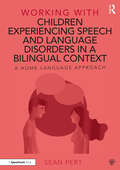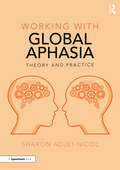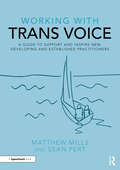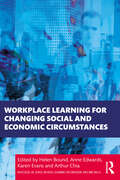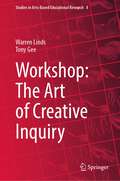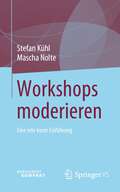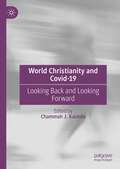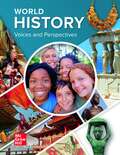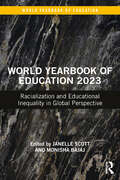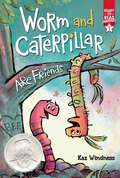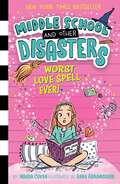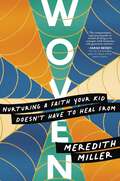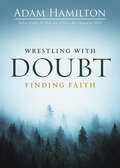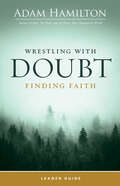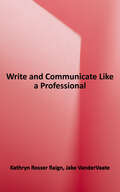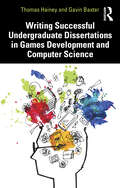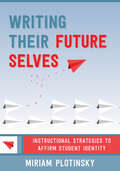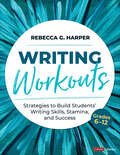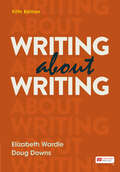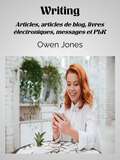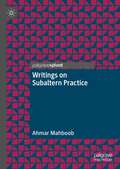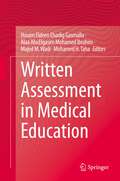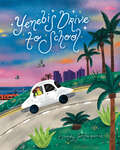- Table View
- List View
Working with Children Experiencing Speech and Language Disorders in a Bilingual Context: A Home Language Approach (Working With)
by Sean PertThe complexity of speech and language disorders can be daunting in a monolingual context. When working with a bilingual child assessment and intervention may appear to be even more complicated. In this book Sean Pert provides the reader with the tools needed to overcome this perception and develop skills in working in a language that they don’t share with the client. By adopting a home language first approach the book discusses how to: identify diversity from disorder introduce effective approaches in line with the best clinical practice work successfully alongside interpreters make assessments and plan interventions set goals for therapy. At the heart of the text is the therapist creating essential partnerships with parents and truly valuing the bilingualism, culture and identity of the child. This leads to better outcomes, not only in speech, language and communication, but also in self-esteem, mental health, social participation and educational and employment success. The book concludes with a handy toolkit of resources including quizzes, case studies and printable extras making it the perfect resource for both experienced and newly qualified practitioners with bilingual and multilingual children in their care.
Working with Global Aphasia: Theory and Practice (Working With)
by Sharon Adjei-NicolGlobal aphasia is the most severe and disabling form of aphasia, yet it has had the least attention within aphasia research and rehabilitation. This practical book provides the reader with a comprehensive understanding of the topic based on both clinical observations and the literature to date. Uniquely, it covers not only the severe language impairments observed in global aphasia but also the co-occurring cognitive impairments that often present an additional challenge when working with this population. This book offers: • A comprehensive understanding of the clinical characteristics of global aphasia illustrated with real case examples • A theoretical overview of the domains of cognition and discussion of the role cognitive deficits play in the clinical presentation of people with global aphasia • Critical analysis of the research evidence on global aphasia • An exploration into the strengths and limitations of common methods used to assess language, cognition, and functional communication in global aphasia • New ways of approaching assessment and treatment which consider the impact of cognitive difficulties • Detailed suggestions of direct and indirect treatment tasks and approaches that can be used with this population, including novel cognitive tasks. This accessible text will provide both experienced speech and language therapists and students new to the subject with the knowledge, skills, and tools to work effectively with people with global aphasia in a range of clinical settings. It will also be an essential resource for anyone considering research with this challenging but highly rewarding population.
Working with Trans Voice: A Guide to Support and Inspire New, Developing and Established Practitioners (Working With)
by Matthew Mills Sean PertThis book is an essential resource for those new to, developing and established in the field of trans voice. Presented in a workbook style and packed with practical exercises for the practitioner to engage with, it explores and explains how to work with clients effectively, while also developing vital cultural knowledge and fundamental skills in voice coaching that will help the practitioner develop insight into and support each person’s unique journey. Matthew Mills and Sean Pert draw on their wealth of experience to encourage the reader to consider what gender means to them, and how gender performance may be taken for granted by people whose gender identity aligns with their sex assigned at birth. The key learning points of this book are illustrated by guiding comments from trans and non-binary people with lived, practical and clinical experience Based on the latest expert practice and informed by the experiences of the clients themselves, Working with Trans Voice allows speech and language therapists and other professionals interested in supporting trans and gender-diverse people to develop the confidence to work with their clients in partnership and solidarity.
Workplace Learning for Changing Social and Economic Circumstances (Routledge-IAL Series on Adult Learning for Emergent Jobs and Skills)
by Anne Edwards Karen Evans Helen Bound Arthur ChiaAt the heart of this book is the rapid pace of change, the need to invest in and create good jobs and support the learning that this entails. It brings together a range of socio-cultural perspectives to examine the hard issues in relation to digitalisation, identity, work design and affordances for learning, mediated by the ecosystems within which work, and the workplace is positioned. The contributors take a strong social justice perspective that seeks to uncover commonly held assumptions about where the responsibility for workplace learning lies, how to understand workplace learning from a range of different perspectives and what it all means for practitioners and researchers in the field. The first section sets the scene in its theorisation of the role and place of workplace learning in the context of changing circumstances. The second section brings together a rich collection of investigations into workplace learning that address the challenges of rapidly changing circumstances. In the final section, the authors consider what workplace learning in changing circumstances means for change practitioners, the changing roles of human resource practitioners, and for workers and quality work. This volume will appeal to graduate and post-graduate students, and academics as well as practitioners such as adult educators, and human resource personnel.
Workshop: The Art of Creative Inquiry (Studies in Arts-Based Educational Research #8)
by Warren Linds Tony GeeThis book explores tools and techniques for creating the arts with groups. It provides insights into why workshops are such an effective and relevant form of creative practice. Throughout, two experienced practitioners share successful principles and qualities. They also include examples of workshops that explore ways of facilitating creative exploration.The authors believe that underpinning any good workshop practice is an understanding of what constitutes a workshop. This is a process in which the relationship between artist/researcher and participant/audience, maker, and witness is fluid. It extends each individual’s abilities and connects doing to learning to inquiring in a single process. The book itself is a dialogue on, and an investigation into, this practice. It fully explores the specificities of workshop practice in relation to how it engages others in arts-based research.Readers learn how workshops involve inquiry into six areas: inquiry into subjects, artistic processes, skills, self, the world, and relationships with others. In the end, this informed investigation helps practitioners to better reflect on their own approaches to arts-based inquiry and research. This, in turn, leads to a better understanding of how readers can use workshops for the maximum benefit of all participants, both individuals and groups.
Workshops moderieren: Eine sehr kurze Einführung
by Stefan Kühl Mascha NolteWorkshops sind im Vorfeld konzipierte, moderiete Arbeitstreffen, bei denen sich Teilnehmende außerhalb der organisationalen Regelinteraktion einer eingegrenzten Thematik widmen. In der Moderatoren- und Berater-Branche hat sich in den letzten Jahren ein Paradigmenwechsel in der Planung und Durchführung von Workshops ausgebildet. Nach dem neuen Paradigma werden Workshops als Elemente in breiter angelegten Interaktionsplänen verstanden, in welchen sie durch ihnen gleichrangige Interaktionsanlässe wie Kontraktgespräche, Sondierungsinterviews oder Großkonferenzen ergänzt werden. Insbesondere dort, wo Workshops auf organisationale Veränderungen zielen, werden sie in eine umfassendere Veränderungsarchitektur eingebettet. In diesem Buch wird kompakt gezeigt, wie man Workshops in einen umfassenden Interaktionsplan einwebt und somit als Element organisationaler Veränderungsprozesse nutzen kann.
World Christianity and Covid-19: Looking Back and Looking Forward
by Chammah J. KaundaThis volume explores how Christians around the world have made sense of the meaning of suffering in the context of and post-COVID-19. It interrogates the question of God, suffering, and structural injustice. Further, it discusses the Christian response to the compounded threats of racial injustice, climate injustice, wildlife injustice, gender injustice, economic injustice, political injustice, unjust in the distributions of the vaccine and future challenges in the post-COVID-19 era. The contributions are authored by scholars, students, activists and clergy from various fields of inquiry and church traditions. The volume seeks to deepen Christian understanding of the meaning of suffering in the context of COVID-19 pandemic. It explores the fresh ways the pandemic can contribute to reconceptualizing human relations and specifically, what it means to be human in the context of suffering, the place of or justifications of God in suffering, human place in creation, and the role of the church in re-articulating the theological meanings and praxes of suffering for today.
World History: Voices and Perspectives
by Spielvogel Jackson J.Students can explore history through an abundance of primary and secondary sources showcasing multiple perspectives, investigate Essential Questions, and make vital connections between the past and present. <p><p>Compelling questions for each topic that encourage deep thought and reflection.
World Yearbook of Education 2023: Racialization and Educational Inequality in Global Perspective (World Yearbook of Education)
by Monisha Bajaj Janelle ScottThe World Yearbook of Education 2023 centers on the intersection of racialization, inequality, and education. It critically examines how racial formation and its associated logics about citizenship, belonging, justice, equality, and humanity manifest in early childhood education, primary, secondary, and higher education, as well as non-formal, community-based education settings. The chapters offer multisited perspectives into how racialization has and continues to shape educational inequality, with an eye towards the agency and resistance of youth and communities in contesting such forms of domination and marginalization. Across three sections, the book examines how forces of imperialism, white supremacy, and colonization have shaped racialization in distinct locations and how education was historically utilized as a site for both the creation and/or reification of difference. It reveals the lingering effects of processes of racialization in distinct locations globally and their intersections with educational policies, ideologies, systems, and realities. Inviting readers to learn, reflect, and engage with the layered and complex realities of racialization and inequality in education across the globe, World Yearbook of Education 2023 is a timely and important contribution to discussions of racialization and provides the field with a robust foundation for future critical inquiry and engagement with the themes of race, racialization, inequality, and education.
Worm and Caterpillar Are Friends: Ready-to-Read Graphics Level 1 (Ready-to-Read Graphics)
by Kaz WindnessA Theodor Seuss Geisel Honor Book A Kirkus Reviews Best Graphic Novel & Comic A New York Public Library Best Book A Chicago Public Library Best of the Best Book This heartwarming and affirming Level 1 Ready-to-Read Graphics book celebrates the beauty of true friendship!Worm and Caterpillar are friends—best friends. Worm loves how they are just alike, but Caterpillar has a feeling there is a big change coming. Then Caterpillar disappears for a while and comes back as Butterfly. Will Butterfly and Worm still be friends? Ready-to-Read Graphics books give readers the perfect introduction to the graphic novel format with easy-to-follow panels, speech bubbles with accessible vocabulary, and sequential storytelling that is spot-on for beginning readers. There&’s even a how-to guide for reading graphic novels at the beginning of each book.
Worst Love Spell Ever! (Middle School and Other Disasters #2)
by Wanda CovenIn this hilarious sequel to the New York Times bestseller Worst Broommate Ever, witch-in-training Heidi Heckelbeck wants her crush to notice her. Featuring black-and-white illustrations and doodles throughout and perfect for fans of Dork Diaries, The Worst Witch and Harper Drew.Maybe there&’s a spell in here that will help me get Hunter&’s attention... Heidi is settling in at Broomsfield Academy. She and her broommate Melanie are trying to get along and Heidi is getting used to her classes, all her new friends, and her very first crush, Hunter! The problem is Hunter is really popular. How will Heidi get him to notice her? Her friends tell her to just be herself, but that sounds so boring! After all, Heidi is a witch-in-training. She knows she can find the perfect love spell to make Hunter fall in love with her. What could possibly go wrong?Join Heidi and her friends for pranks, potions and magical misahaps in this bestselling series!
Woven: Nurturing a Faith Your Kid Doesn't Have to Heal From
by Meredith MillerIn this inspiring parenting book, learn how to create space for your children to get to know God in a way that focuses on trust instead of a list of rigid rules. Most Christian parenting books are ready with exact practices every family should follow in order to raise obedient children. In this obedience-training model, faith is a wall, constructed brick by brick, as adults tell children what to believe and how to behave. But what if obedience is not the goal of Christian parenting? What if it&’s our job as parents to instead help our kids get to know God and discover that God can be trusted? And what if faith is not constructed brick by brick, but rather woven strand by strand? Much like a spider&’s web, in which anchor strands and internal threads combine to form a unique web, Woven can help children anchor to who God is and have faith practices that are rich, textured, and all their own. Kids need space to explore the Bible, ask big questions, and even change their understanding of God and faith along the way. With Woven, families can nurture the kind of faith that can flex and grow, be broken and repaired. This is the sort of faith that can stand up to the life a child will live, the doubts they will encounter, and the questions that will come up along the way. So many parents want to pass along their faith, but know that God is so much bigger than the list of do&’s and don&’ts they were taught about as children. They want to pass along a faith their child doesn&’t have to heal from. Woven is the guidebook parents have been looking for. With a deep reverence for scripture and suggested activities to help your family grow in faith together, Woven is for parents who want to go beyond a list of do&’s and don&’ts and pass along a resilient faith based on genuine love for and trust in God.
Wrestling with Doubt, Finding Faith
by Adam HamiltonDoes your faith make room for questions?Everyone has doubts. Where is God when bad things happen? Does God hear our prayers? Is there a heaven? How can we know? Often, we treat such questions as the enemy of faith. But uncertainty doesn’t mean our belief is lacking. Doubt can be a path to a deeper, richer encounter with God. In Wrestling with Doubt, Finding Faith, join best-selling author and pastor Adam Hamilton as he discusses some of our most significant sources of doubt and shows how a steady trust in God can emerge from them. You will delve into questions like: “Does God exist? How can I know?” “Is the Bible true?” “Why do prayers go unanswered?” Hamilton approaches these sources of doubt with honesty and insight, drawing on the rich wisdom of the Bible, Christian tradition, and his experience walking with thousands of people on their spiritual journeys. Whether you’re a longtime Christian or someone brand new to faith, this book will lead you to a trust in God that gives you the courage to ask tough questions. Though you may wrestle with doubt, you’ll discover a faith that—rather than providing simple answers—includes belief and trust as well as uncertainty and mystery. The book can be used anytime throughout the year and can be read alone, used by small groups, or as an outreach gift for visitors. Components include a comprehensive Leader Guide, a six-session DVD featuring Adam Hamilton (with closed captioning), and a digital worship and sermon series, making this perfect as a group study and churchwide program done throughout the year.
Wrestling with Doubt, Finding Faith Leader Guide
by Adam HamiltonDoes your faith make room for questions?The Leader Guide contains everything needed to guide a group through the six-week study, including session plans, activities, discussion questions, and multiple format options. Everyone has doubts. Where is God when bad things happen? Does God hear our prayers? Is there a heaven? How can we know? Often, we treat such questions as the enemy of faith. But uncertainty doesn’t mean our belief is lacking. Doubt can be a path to a deeper, richer encounter with God.In Wrestling with Doubt, Finding Faith, join best-selling author and pastor Adam Hamilton as he discusses some of our most significant sources of doubt and shows how a steady trust in God can emerge from them. You will delve into questions like:“Does God exist? How can I know?”“Is the Bible true?”“Why do prayers go unanswered?”Hamilton approaches these sources of doubt with honesty and insight, drawing on the rich wisdom of the Bible, Christian tradition, and his experience walking with thousands of people on their spiritual journeys. Whether you’re a longtime Christian or someone brand new to faith, this book will lead you to a trust in God that gives you the courage to ask tough questions. Though you may wrestle with doubt, you’ll discover a faith that—rather than providing simple answers—includes belief and trust as well as uncertainty and mystery.Additional components include the book, Wrestling with Doubt, Finding Faith, video teaching sessions featuring Adam Hamilton (with closed captioning), and a digital worship and sermon series that make this perfect as a group study and church-wide program done throughout the year.
Write and Communicate Like a Professional
by Kathryn Rosser Raign Jake VanderVaateThis book is for the introductory technical writing student seeking to improve their writing and communication. The book covers how to improve professional style and tone, develop professional documents, work in teams, and plan and execute multiweek projects. It also includes various types of professional writing―such as letters, texts, handbooks, reports, agendas, press releases, and newsletters―while focusing on those communication forms used most often: emails, memos, and short reports. Authors Kathryn Raign and Jake VanderVaate also cover such important communication skills as collaborative writing in a chapter on sharing and giving feedback. With clear graphics, clever problem-solution rubrics, and the latest coverage of informal technical writing delivered through social media formats of email and text, Write and Communicate Like a Professional is essential reading for your professional success.
Writing Successful Undergraduate Dissertations in Games Development and Computer Science
by Thomas Hainey Gavin BaxterWriting a dissertation in the final year at university can be a highly daunting task for any student, but particularly if the degree is practically oriented and implementation based. This book provides an accessible, concise guide to producing a dissertation in computer science, software engineering, or games development degrees, with research projects typically involving design, implementation, testing, and evaluation. Drawing on the authors’ extensive knowledge and experience of supervising dissertation students, the book offers a step-by-step guide to the key areas of writing a dissertation alongside real-life examples. Chapters cover: Producing literature reviews. Formulating research questions. Understanding epistemologies. Selecting methodologies and research methods. Software development life cycle methodologies. Evaluation, statistical analysis, and formulating conclusions. Working methodically through the different stages of writing a dissertation, this is an essential comprehensive guide for all students producing any form of dissertation in computer science, software engineering, or games development.
Writing Their Future Selves: Instructional Strategies to Affirm Student Identity
by Miriam PlotinskyWhatever subject you teach, you can encourage students’ sense of self-worth. “I’m a bad writer” is a disclaimer every secondary teacher has heard many times. Overcoming that negative self-image, Plotinsky argues, is key to helping students build a positive academic identity—and because of the vulnerability associated with sharing what we write, the benefits of interrupting this particular form of deficit thinking extend far beyond English class. Drawing on her years of experience as an English teacher and literacy specialist, Miriam Plotinsky uses writing instruction as a powerful vehicle to examine how teachers can help students build a sense of themselves as legitimate, valuable contributors to the world around them. The chapters move fluidly through ways to build capacity such as celebrating student voice, separating grading from class participation, giving feedback that inspires trust, and avoiding the labeling of students. Along the way, teachers in other content areas contribute insights into how the identity-building strategies in the book can be applied to their own disciplines.
Writing Workouts, Grades 6-12: Strategies to Build Students’ Writing Skills, Stamina, and Success (Corwin Literacy)
by Rebecca G. HarperStudent Writers Go the Distance with a Strength-Training Approach Good writers don’t wing it—they have a plethora of skills. They list, picture, circle, strategize and revise to make language come alive. They know what to use and when. Like ace athletes, they are highly trained, well-versed in the techniques found in this lively book. Writing Workouts provides a method for instruction that gives students the fun they want and the targeted skill practice they need. Slinky paragraphs, pop-up poems, paint chip plotting, and many other activities get the serious business of teaching critical and creative writing done. Author Rebecca Harper shows you how to go about it systematically, so writing is tied to relevant lessons and writing standards. Help students learn to: Hone skills in persuasive writing, argument, fiction, poetry, memoir and more Toggle between brief and multi-step writing tasks, to build stamina (and not hyperventilate when faced with complex compositions) Tap into auditory, visual, and kinesthetic, and digital components of crafting Think about word, sentence, and paragraph-level techniques Jump the high-jumps of research writing by getting good at each smaller leap Students in middle school and high school often feel they are forever-sprinting toward a high-stakes writing task. With Writing Workouts, you help students crowd out stress with a strength-training approach to success.
Writing Workouts, Grades 6-12: Strategies to Build Students’ Writing Skills, Stamina, and Success (Corwin Literacy)
by Rebecca G. HarperStudent Writers Go the Distance with a Strength-Training Approach Good writers don’t wing it—they have a plethora of skills. They list, picture, circle, strategize and revise to make language come alive. They know what to use and when. Like ace athletes, they are highly trained, well-versed in the techniques found in this lively book. Writing Workouts provides a method for instruction that gives students the fun they want and the targeted skill practice they need. Slinky paragraphs, pop-up poems, paint chip plotting, and many other activities get the serious business of teaching critical and creative writing done. Author Rebecca Harper shows you how to go about it systematically, so writing is tied to relevant lessons and writing standards. Help students learn to: Hone skills in persuasive writing, argument, fiction, poetry, memoir and more Toggle between brief and multi-step writing tasks, to build stamina (and not hyperventilate when faced with complex compositions) Tap into auditory, visual, and kinesthetic, and digital components of crafting Think about word, sentence, and paragraph-level techniques Jump the high-jumps of research writing by getting good at each smaller leap Students in middle school and high school often feel they are forever-sprinting toward a high-stakes writing task. With Writing Workouts, you help students crowd out stress with a strength-training approach to success.
Writing about Writing
by Elizabeth Wardle Doug DownsThis popular guide helps you master essential “threshold concepts” that will improve your writing.
Writing: Articles, articles de blog, livres électroniques, messages et PLR (Comment faire... #123)
by Owen JonesWriting Articles, articles de blog, livres électroniques, messages et PLR Plus de gens écrivent maintenant qu'à n'importe quel moment de l'histoire de la civilisation. Ceci est principalement dû à l'éducation et à plus de temps libre. La génération des parents des baby-boomers était la première génération de lecteurs de masse – certainement en Occident, et probablement dans le monde. Leurs parents savaient lire, en général, mais n'avaient aucune tradition de lecture de livres. Au lieu de cela, ils lisent surtout des journaux. Leurs enfants ont eu une meilleure éducation et ont repris l'habitude de lire de leurs parents. Ils ont également été encouragés à lire des livres à l'école. La première génération où cela s'est produit. Leurs enfants, les baby-boomers de l'après-guerre, ont continué la progression et sont devenus des lecteurs avides. À cette époque, il n'y a pas si longtemps, disons entre soixante-dix et trente ans, les gens écrivaient des lettres à la main. Ce fut une expérience personnelle longue mais très agréable. Ensuite, l'ordinateur personnel, le courrier électronique et Internet ont commencé à se répandre parmi les masses, et la plume et l'encre ont progressivement été remplacées par des babillards électroniques, des publications sur des forums et des e-mails. Avant ce point, l'écriture avait été un événement spécial pour la plupart des gens... des lettres de remerciement, des cartes postales, des cartes d'anniversaire et l'étrange lettre personnelle à la maison ou à un ami. L'ordinateur personnel permettait d'envoyer facilement une note rapide à quelqu'un. Il a fallu beaucoup moins de temps pour écrire et livrer, ou se faire livrer par la poste. Soudain, tout le monde a commencé à écrire et à publier pour sa famille, ses amis, des inconnus et même des ennemis. Une barrière avait été levée – des barrières de temps et de formalité,
Writings on Subaltern Practice
by Ahmar MahboobSubaltern theory emerged as a small voice within academia decades ago. Over time, this work generated significant debate and numerous publications, talks, and conferences. However, little has changed in the experienced lives of the masses. This led people to wonder: “the subalterns seem to have a voice, but can they take action?”; or, in other words, is there subaltern practice?This collection of essays and poems, written with a broad audience in mind, hopes to demonstrate not just how the subaltern can identify and question hegemonic practices, but how they can create alternative frameworks and material that enable themselves and their communities. In doing so, this book aims to demonstrate not just how deep the colonial poisons run, but also how to detoxify ourselves and the environment around us.The writings included in this book study the inequalities that we experience in and around us and suggest actions and practices that can help us regain harmony. It is a call for action and a sharing of ideas that can enable us to regain balance and fulfil our human responsibilities.
Written Assessment in Medical Education
by Hosam Eldeen Elsadig Gasmalla Alaa AbuElgasim Mohamed Ibrahim Majed M. Wadi Mohamed H. TahaThis book is an indispensable yet simple reference for the daily use of a medical teacher. It addresses the needs of medical teachers interested in providing instruction and assessment in writing and written language, offering detailed guidance in simple and straightforward language. The book goes beyond mere description; it provides many practical examples, valuable materials that can be utilized in training workshops and medical educator professional development courses. The book will be of interest to novice and experienced teachers in medical schools, in addition to university teachers in other health professions, such as dentistry, pharmacy, nursing, medical laboratory, physiotherapy, biomedical engineering and veterinary medicine.
Yenebi's Drive to School
by Sendy SantamariaDreamers meets School's First Day of School in this vibrant story that puts a whole new spin on one loving family's morning drive to school.Every morning, I'm up at four o'clock.I brush my teeth, get dressed, and drag my sister Melanie to the car where Mami's waiting for us.¡Se nos va hacer tarde! ¡Apurarse!For the next two hours, we'll be in the car driving—past tamale vendors (my favorite part), through la linea (my least favorite part), and across the US border. That's how we get to school every day. This is our normal. ¡Vamos!In a winning voice and a bright palette, debut author-illustrator Sendy Santamaria tells the story of one girl's commute—a commute Sendy herself made growing up as an American citizen living in Mexico. Yenebi's Drive to School takes readers on a trip to school that many will recognize as very similar to their own.INSPIRED BY A TRUE STORY: By celebrating the daily details of a child's commute to school that reflects the author's experience, this universal and inviting picture book is truly a mirror, a window, and a door. TIMELY TOPIC: An accessible approach to a serious (and seriously underdocumented) part of American life for many young readers. Teachers, librarians, and parents will appreciate the way this book blends the importance of current events in an easily understandable narrative that kids will enjoy following along with. FAMILY-CENTRIC: The journey described in this story—a loving family's daily trip to school—is timeless and relatable, yet wonderfully specific. UNIQUE EXPERIENCES: Like Last Stop on Market Street, this book leans into the narrator (and creator)'s very particular experience and yet makes the individuality of such an experience highly relatable, communicating to readers that even their most personal routines are part of what connects them with all humans. Young readers who take the bus to school or get driven a few blocks by their parents will see what makes them similar to kids like the author, even if the shape of their routines are different. FRESH APPROACH TO A CLASSIC TOPIC: The author turns the "back to school" trope on its head by making the book all about the trip, rather than focusing on apprehension or excitement about school itself. Perfect for:Teachers and librarians looking for picture books by Latinx creatorsParents looking for bilingual content and bicultural kids' booksKids who want to read about experiences different than their ownFans of Dreamers, Our Class is a Family, and The Name Jar
Yojana April 2023
by YojanaThe April 2023 edition of the magazine focuses on Start Up India. In the magazine, topics like Opportunities for Youth in the Startup Ecosystem, Startup India Action Plan, Foundation of India Startup Ecosystem, Startup 20 Engagement Group and Under India’s G20 Presidency have been discussed.
